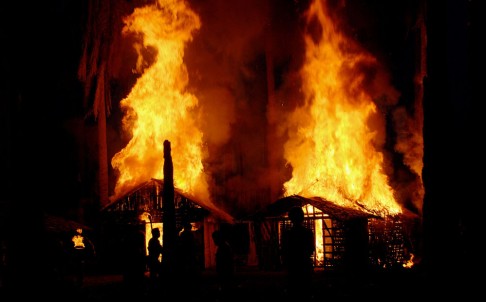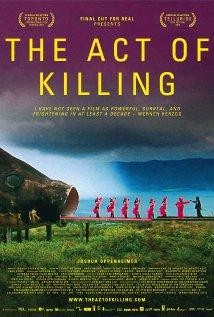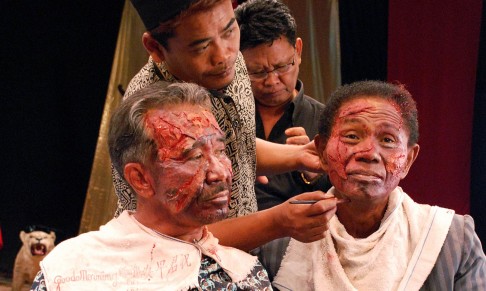Co-director of The Act of Killing says crew fear for their lives
Co-director of Oscar-nominated documentary on nation's bloody communist purge says he and his colleagues will stay anonymous
PUBLISHED : Monday, 03 March, 2014, 3:13am
UPDATED : Monday, 03 March, 2014, 6:26am
Reuters in Jakarta

A scene from The Act of Killing. The film re-enacts violence which killed 500,000 Indonesians. Photo: HK International Film Festival Society
A chilling documentary about one of the worst massacres since the second world war is up for an Academy Award. If it does win, don't expect the Indonesian co-director to go on stage to receive an Oscar: he's worried for his life.

The Act of Killing
The nearly three-hour The Act of Killing centres on one of the killers in Indonesia's bloody purge of what was then the biggest communist party outside China and the Soviet Union, as he re-enacts for the camera, with no apparent sign of remorse, the way nearly 50 years earlier he had dispatched his victims by strangling them with a loop of wire.
It touches on the darkest period of Indonesia's already violent early years as an independent state and which even after almost half a century is so raw a memory that it remains largely brushed from mainstream debate.
At least 500,000 people are thought to have died in the rampaging violence that started in late 1965 after former president and then-general Suharto and the military took power following an abortive communist coup. A million or more people were jailed.
"It's a tragedy and we, just like anybody else, despise those in the movie and the re-enactment of the atrocities. These people don't belong in Indonesia today," said presidential spokesman Teuku Faizasyah.
He added: "It requires a lot of revisiting but ... I don't think we are mature enough [yet] as a nation."
In a sign of how sensitive the topic remains, the Indonesian co-producer of the documentary and the other Indonesian members of the film crew say they do not want their names to be made public. "Maybe we are too paranoid, but we discussed with various activists groups about the risk, the possibility of going from a threat to a real attack on our lives, and we really don't know what would happen if we revealed our names," the co-director said.
Much of the slaughter was in the populous main island of Java and Bali, now a popular resort.
Initially, it was the military that led efforts to crush the communist party. The operation was headed by a general, Sarwo Edhie Wibowo, the father of the country's current first lady, and whose son is thought to have an eye on the presidency.The campaign mushroomed into an orgy of killing that saw the country's biggest Muslim group, landowners, paramilitary organisations and those simply with a grudge against a neighbour, go after communist party members and their supposed sympathisers.

Adi Zulkadry and Anwar Congo, former death squad members, being made up for a recreation of a 1965 massacre. Photo: AFP
For decades, children of alleged communists were kept at arm's length by the government. One of Suharto's closest advisers at the time even sent his daughter abroad after she developed a relationship with the son of a supposed communist.
Some observers worry the film does little to show the political context of the period and the tension at the grassroots level between religious groups and landowners and the communists which was already seething before the attempted coup.
"The issue is still divisive in society and nobody has ever really tried to reconcile," said Agus Widjojo, a retired army lieutenant-general who heads a think-tank on policy.
"Indonesian society is not brave enough to start the endeavour to face the truth of the past ... But it's the only way we can learn lessons about what we have done wrong and to correct it so that we can assure future generations of Indonesia that those mistakes will not be repeated."
For the film's Indonesian crew, the anonymity will not end any time soon, according to the co-director.
"Revealing our identities would need a genuine structural change in Indonesia ... and that genuine reconciliation will take a long time, but the time to start that is now," the co-director said.
The 86th annual Academy Awards will be presented this morning Hong Kong time.
